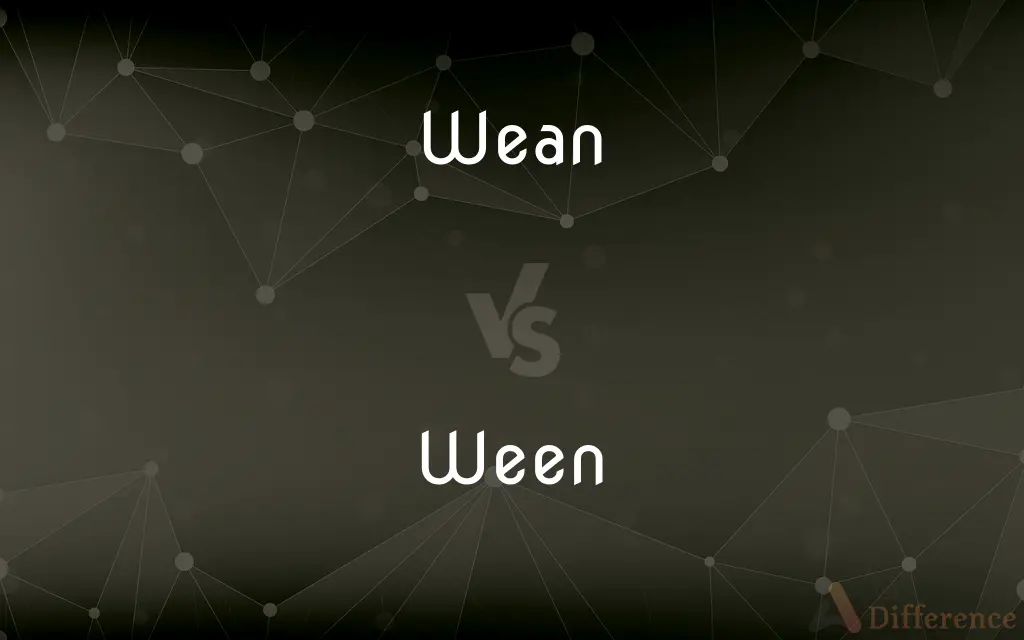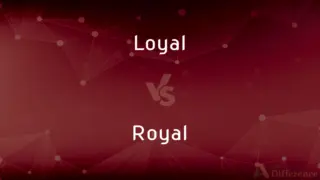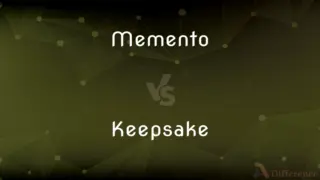Wean vs. Ween — What's the Difference?
By Fiza Rafique & Maham Liaqat — Updated on March 22, 2024
Wean involves gradually reducing dependence, especially from breastfeeding, while ween is an archaic term for thinking or supposing.

Difference Between Wean and Ween
Table of Contents
ADVERTISEMENT
Key Differences
Weaning is a process often associated with introducing infants to solid foods and reducing their dependency on breast milk or formula. On the other hand, ween, though now largely archaic or used in dialects, means to think, suppose, or believe. While weaning is a physical and developmental process, weening involves a mental or cognitive action.
Weaning is crucial for a child's growth, allowing them to transition to more solid foods and become less dependent on their mothers. In contrast, weening, in its traditional sense, involves the act of holding a belief or making an assumption, which doesn't have a physical aspect to it. This difference highlights the distinct nature of each term, with one being rooted in physical growth and the other in mental processes.
The term "wean" is commonly used in modern language, especially in contexts related to child development and nutrition. Ween, however, is rarely used in contemporary language, and when it is, it's often in a poetic or historical context. This difference in usage underscores how language evolves and how some words can become less common over time.
In terms of etymology, "wean" derives from the Old English 'wenian', meaning to accustom or habituate, specifically referring to the process of accustoming a child to food other than its mother's milk. Ween, on the other hand, comes from the Old English 'wenan', meaning to expect, hope, or suppose, indicating a more cognitive or speculative action.
Despite their differences, both terms share a commonality in their Old English roots, reflecting the rich history of the English language and how it has evolved over centuries. This linguistic evolution showcases the dynamic nature of language and how terms can diverge in meaning and usage over time.
ADVERTISEMENT
Comparison Chart
Definition
To accustom (an infant) to food other than its mother's milk
To think or suppose (archaic)
Context of Use
Child development, nutrition
Rare, often poetic or historical
Physical or Mental
Physical (related to eating)
Mental (related to believing)
Modern Usage
Common
Rare, archaic
Origin
Old English 'wenian'
Old English 'wenan'
Compare with Definitions
Wean
To gradually introduce an infant to solid food in addition to breast milk or formula.
It's time to wean the baby and introduce some mashed vegetables.
Ween
To think or suppose (mostly archaic).
I ween he will not come today.
Wean
To accustom someone to managing without something on which they have become dependent.
The program is designed to wean young adults off social welfare.
Ween
To expect or hope (used in poetry or archaic language).
She weens to reunite with her old friends.
Wean
To cause to stop depending on a mother's milk for nourishment.
The vet suggested wean the kittens at eight weeks old.
Ween
To believe or imagine, often mistakenly.
He weened that his work was nearly done.
Wean
To detach from a dependency or habit.
She plans to wean herself off caffeine over the next month.
Ween
To indulge in wishful thinking.
In his heart, he weened for a happier time.
Wean
To remove from conditions or influences regarded as undesirable.
The workshop aims to wean employees from using outdated practices.
Ween
To hold an opinion or notion.
I ween that the journey will be perilous.
Wean
Accustom (an infant or other young mammal) to food other than its mother's milk.
Ween
Ween is an American rock band from New Hope, Pennsylvania, formed in 1984 by Aaron Freeman and Mickey Melchiondo, better known by their respective stage names, Gene and Dean Ween. Generally categorized as an alternative rock band, the band are known for their highly eclectic catalog of songs inspired by funk, soul, country, gospel, prog, psychedelia, R&B, heavy metal, punk rock, and countless more.
Wean
A young child.
Ween
Be of the opinion; think or suppose
He, I ween, is no sacred personage
Wean
To accustom (the young of a mammal) to take nourishment other than by suckling.
Ween
To think; suppose.
Wean
To detach gradually from that to which one is strongly habituated or devoted
She weaned herself from cigarettes.
Ween
(obsolete) Doubt; conjecture.
Wean
To accustom to something from an early age. Often used with on
“The northerners among the refugees ... were weaned on harsh weather and infertile soils and are known for their rigorous work ethic” (Lowell Weiss).
Ween
(slang) wiener dog, dachshund
Wean
(transitive) To cease giving breast milk to an offspring; to accustom and reconcile (a child or young animal) to a want or deprivation of mother's milk; to take from the breast or udder.
The cow has weaned her calf.
Ween
(slang) penis
Wean
(intransitive) To cease to depend on the mother's milk for nutrition.
The kittens are finally weaning.
Ween
(archaic) To suppose, imagine; to think, believe.
Wean
To cause to quit something to which one is addicted, dependent, or habituated.
He managed to wean himself off heroin.
Ween
(dated) To expect, hope or wish.
Wean
To cease to depend.
She is weaning from her addiction to tobacco.
Ween
To weep or cry.
The boy's mother weened day and night.
Wean
To raise, to help grow toward maturity
Ween
(obsolete) To lament.
Wean
A small child.
Ween
To think; to imagine; to fancy.
I have lost more than thou wenest.
For well I ween,Never before in the bowers of lightHad the form of an earthly fay been seen.
Though never a dream the roses sentOf science or love's compliment,I ween they smelt as sweet.
Wean
To accustom and reconcile, as a child or other young animal, to a want or deprivation of mother's milk; to take from the breast or udder; to cause to cease to depend on the mother nourishment.
And the child grew, and was weaned; and Abraham made a great feast the same day that Isaac was weaned.
Wean
Hence, to detach or alienate the affections of, from any object of desire; to reconcile to the want or loss of anything.
The troubles of age were intended . . . to wean us gradually from our fondness of life.
Wean
A weanling; a young child.
I, being but a yearling wean.
Wean
Gradually deprive (infants) of mother's milk;
She weaned her baby when he was 3 months old and started him on powdered milk
Wean
Detach the affections of
Common Curiosities
What is the process of weaning like?
Weaning involves gradually introducing solid foods to an infant's diet while slowly reducing breast milk or formula intake.
Why is "ween" considered archaic?
"Ween" has fallen out of common usage and is now considered old-fashioned, making it archaic.
Can "wean" be used outside the context of feeding infants?
Yes, "wean" can also be used to describe the process of reducing dependency on anything, not just food for infants.
What is the origin of "wean"?
"Wean" originates from the Old English word 'wenian', which means to accustom or habituate.
Is weaning a gradual process?
Yes, weaning is typically a gradual process to ensure a smooth transition for the infant.
What does it mean to wean a baby?
Weaning a baby means gradually introducing solid foods while decreasing the baby's reliance on breast milk or formula.
What does it mean to "ween oneself" off something?
To "ween oneself" off something means to gradually reduce dependence or use of it.
How does weaning benefit a child?
Weaning benefits a child by introducing them to a variety of flavors and textures, aiding their development and nutritional intake.
Is "ween" still used in modern English?
"Ween" is largely considered archaic and is rarely used in modern English, except perhaps in poetry or historical contexts.
What is the origin of "ween"?
"Ween" comes from the Old English 'wenan', meaning to expect, hope, or suppose.
Why is weaning an important milestone in child development?
Weaning is important as it marks the beginning of an infant's ability to consume and digest solid foods, contributing to their growth and development.
What are the signs a baby is ready to be weaned?
Signs include the baby showing interest in food, being able to sit up, and losing the tongue-thrust reflex.
How does the meaning of "wean" differ from "ween"?
"Wean" refers to reducing dependency, especially on breast milk or formula, while "ween" is an archaic term for thinking or supposing.
Can "ween" be used in modern contexts?
While rare, "ween" can be used in modern contexts, often for poetic or stylistic effect.
Share Your Discovery

Previous Comparison
Loyal vs. Royal
Next Comparison
Memento vs. KeepsakeAuthor Spotlight
Written by
Fiza RafiqueFiza Rafique is a skilled content writer at AskDifference.com, where she meticulously refines and enhances written pieces. Drawing from her vast editorial expertise, Fiza ensures clarity, accuracy, and precision in every article. Passionate about language, she continually seeks to elevate the quality of content for readers worldwide.
Co-written by
Maham Liaqat













































